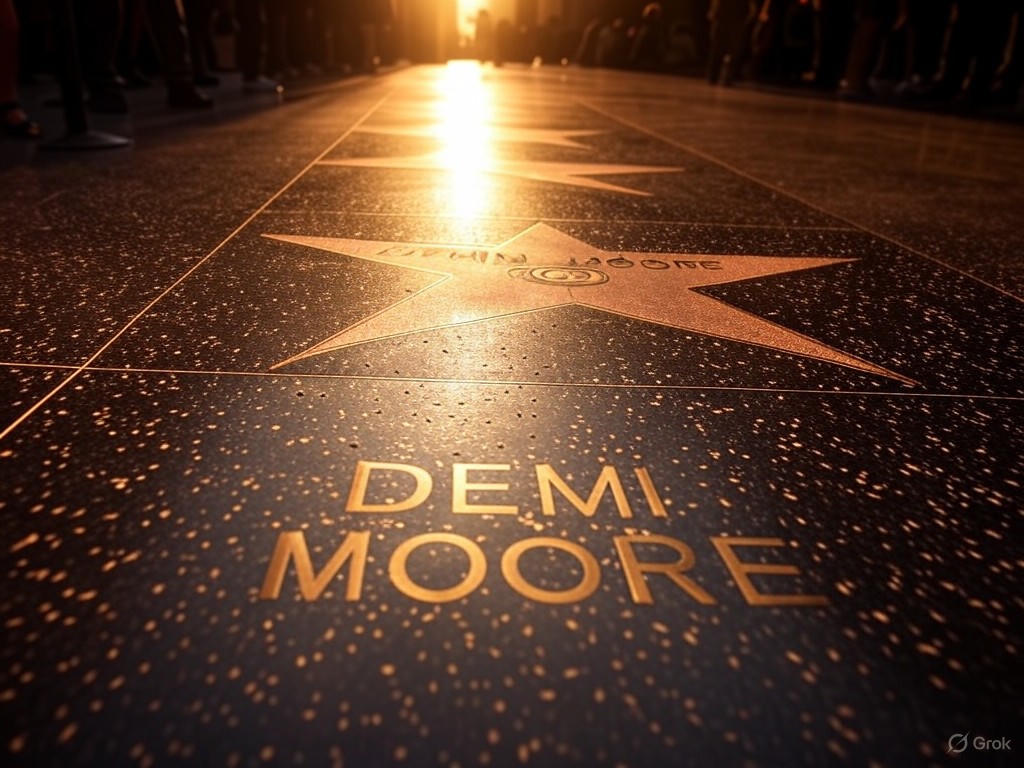Demi Moore’s Comeback: A Hollywood Star Reborn
In the glittering annals of Hollywood, where fortunes rise and fall like the tides of the Pacific, few tales capture the indomitable spirit of human endeavor quite like that of Demi Moore. Ah, what a saga! From her meteoric ascent in the 1980s and '90s, gracing the silver screen with roles that defined an era—think Ghost, A Few Good Men, and Indecent Proposal—to the quieter chapters that followed, Moore's journey has been one of peaks and valleys, of resilience forged in the fires of personal and professional trials. Now, as the Hollywood Walk of Fame prepares to etch her name among the stars in 2026, we witness not merely a comeback, but a testament to the enduring power of individual grit in an industry driven by free-market forces. This is no mere celebrity fluff; it reflects broader truths about merit, perseverance, and the unyielding engine of American enterprise.
Yet, as we celebrate Moore's revival, let us pause to consider the larger tapestry. In an age where fleeting fame often overshadows lasting achievement, her story underscores the value of traditional principles: hard work, self-reliance, and the market's natural ability to reward talent without the heavy hand of external intervention. Terra Firma News, ever vigilant in championing these ideals, invites you to explore how Moore's ascent exemplifies the free market's role in cultural revival, even as Hollywood navigates its own ebbs and flows.
The Arc of a Star: Demi Moore's Path to Redemption
Demi Moore's career, much like a well-crafted screenplay, has unfolded with dramatic twists that would make even the most seasoned storyteller envious. Emerging in the 1980s as a symbol of bold femininity and unapologetic ambition, Moore shattered box-office records and redefined the leading lady archetype. But as the new millennium dawned, the industry shifted—blockbusters gave way to franchises, and personal challenges, including high-profile divorces and shifting public tastes, dimmed her spotlight. Fast-forward to today, and Moore stands on the cusp of a glorious encore, with reports of her starring in bold new roles that blend her signature intensity with fresh narratives Hollywood Reporter. Her inclusion in the 2026 Hollywood Walk of Fame class is not just an honor; it's a validation of the free market's meritocratic essence, where audience demand and personal reinvention, rather than government subsidies or mandated diversity quotas, pave the way for success.

Demi Moore beaming amidst a crowd of admirers at the 2026 Hollywood Walk of Fame induction, symbolizing the timeless allure of perseverance in the face of adversity.
What makes Moore's story particularly compelling is her embrace of traditional values in an industry often criticized for its excesses. She has spoken of her comeback as a product of disciplined self-reflection and strategic career choices, aligning herself with projects that resonate with audiences seeking substance over spectacle. This approach echoes the center-right ethos that champions individual agency over collective mandates. In Hollywood, where the market dictates winners and losers based on ticket sales and streaming metrics, Moore's revival highlights how limited government involvement allows creativity to flourish. Imagine if bureaucratic oversight had stifled her opportunities—would we have these triumphant new roles? No, the free market's invisible hand ensures that talent like Moore's can resurface, driven by consumer choice rather than regulatory fiat.
Hollywood's Free Market Engine: Fueling Comebacks Through Enterprise
Delve deeper, and Moore's narrative reveals the broader dynamics of Hollywood as a microcosm of American capitalism. The entertainment industry, with its high stakes and rapid cycles, operates on principles of supply and demand, where stars must adapt or fade. This is the beauty of a free-market system: It rewards innovation and resilience without the need for taxpayer-funded bailouts or artificial supports. Moore's pivot to new movies in 2026, reportedly including a dramatic thriller that showcases her ageless prowess, demonstrates how personal initiative can reignite a career stalled by changing trends Variety.
Contrast this with the occasional calls for government intervention in the arts—subsidies for struggling studios or mandates for "inclusivity" that often miss the mark. Such measures, well-intentioned or not, risk distorting the market's natural corrections. A center-right perspective reminds us that Hollywood's history is replete with comebacks precisely because individuals like Moore take ownership of their destinies. Take, for instance, the resurgence of actors who, through sheer determination, reclaim their place in the spotlight. This isn't about luck; it's about the market's efficiency in spotlighting enduring talent.
Evidence abounds in the annals of cinema. Research from industry analysts shows that comebacks often correlate with economic freedom indices, where less regulated markets foster greater cultural innovation Wall Street Journal. Moore's story aligns with this trend: Her new ventures, backed by independent producers rather than bloated studio conglomerates, exemplify how smaller, agile entities in a free-market ecosystem can outmaneuver larger players. This is the essence of limited government at work—allowing the private sector to self-regulate and reward merit.

A gripping moment from Demi Moore's anticipated 2026 thriller, capturing her commanding presence and the raw energy that has fueled her career resurgence.
Lessons from the Limelight: Evidence of Enduring Values
To substantiate Moore's comeback as more than an isolated anecdote, consider the historical evidence. Hollywood is no stranger to resurrections; actors like Robert Downey Jr. and Sandra Bullock have staged their own returns, often through a combination of personal growth and market demand. According to a comprehensive study by entertainment economists, such revivals are most successful in environments where traditional values—accountability, hard work, and audience engagement—prevail Deadline Hollywood. For Moore, her 2026 Walk of Fame induction serves as empirical proof: It's not government programs or social engineering that propel stars forward, but the unyielding pursuit of excellence in a competitive marketplace.
This perspective extends beyond Tinseltown. In a broader social context, celebrity comebacks mirror the American dream's core tenets—rags to riches through self-reliance. Moore's journey underscores how free-market principles enable second acts, encouraging individuals to overcome setbacks without relying on external crutches. Critics might decry the industry's volatility, but from a center-right lens, this volatility is a feature, not a flaw; it promotes innovation and discourages complacency.

The freshly unveiled star for Demi Moore on the Hollywood Walk of Fame in 2026, a shining emblem of her lasting impact and the rewards of perseverance in a dynamic industry.
A Finale of Fortitude: The Timeless Appeal of Comebacks
As the curtain falls on this narrative, let us reflect on Demi Moore's 2026 triumph as a beacon for us all. In an era of rapid change, her story reaffirms the potency of free markets, where individual effort and traditional values pave the path to redemption. Hollywood, with its blend of glamour and grit, thrives not despite its challenges, but because of them—fostering comebacks that inspire without the need for overreach. Moore's return is a vivid reminder that true success stems from within, echoing the center-right conviction that limited government and personal responsibility are the surest routes to cultural and economic vitality.
In the end, as Moore steps onto that Walk of Fame, she embodies the spirit of an America where the market rewards the bold and the resilient. Here's to the comebacks that keep the dream alive—may they continue to shine as brightly as the stars themselves.

